Financial System Adaptability and Resilience
Financial systems differ across countries and tend to evolve slowly over time. Their structure is typically stable, but their resilience is often tested. A well-functioning financial system is vital for economic development, as it ensures that capital flows to the most productive and valuable investment opportunities. However, systemic vulnerabilities can have far-reaching consequences. For example, the 2007–08 global financial crisis emerged from within the financial sector itself when complex financial products fuelled a credit bubble in the U.S. housing market, threatening global economic stability when the bubble burst. That event led to extensive policy and regulatory reforms to strengthen financial system resilience.
Financial systems continue to face significant challenges. External shocks like the COVID-19 pandemic, the climate crisis, the green economic transition, and the energy crisis driven by geopolitical conflict all underscore the importance of financial systems that can absorb shocks and adapt to changing economic conditions. Motivated by these pressing issues, we investigate how financial systems respond to crises, which institutions and policies improve resilience, and the role of finance systems' setup in broader economic transformations. We use diverse data sources, including bank and firm-level data, regulatory reports, and house price and election data, to inform evidence-based policy.
Research Cluster
Financial Resilience and RegulationYour contact

- Department Financial Markets
EXTERNAL FUNDING
08.2022 ‐ 07.2025
OVERHANG: Debt overhang and green investments - the role of banks in climate-friendly management of emission-intensive fixed assets
The collaborative project “Debt Overhang and Green Investments” (OVERHANG) aims to investigate the role of banks in the climate-friendly management of emission-intensive fixed assets. This will identify policy-relevant insights on financial regulation, government-controlled lending and financial stability, as well as raise awareness among indebted stakeholders.
01.2015 ‐ 12.2019
Interactions between Bank-specific Risk and Macroeconomic Performance
07.2016 ‐ 12.2018
Relationship Lenders and Unorthodox Monetary Policy: Investment, Employment, and Resource Reallocation Effects
Leibniz Association
We combine a number of unique and proprietary data sources to measure the impact of relationship lenders and unconventional monetary policy during and after the European sovereign debt crisis on the real economy. Establishing systematic links between different research data centers (Forschungsdatenzentren, FDZ) and central banks with detailed micro-level information on both financial and real activity is the stand-alone proposition of our proposal. The main objective is to permit the identification of causal effects, or their absence, regarding which policies were conducive to mitigate financial shocks and stimulate real economic activities, such as employment, investment, or the closure of plants.
Refereed Publications
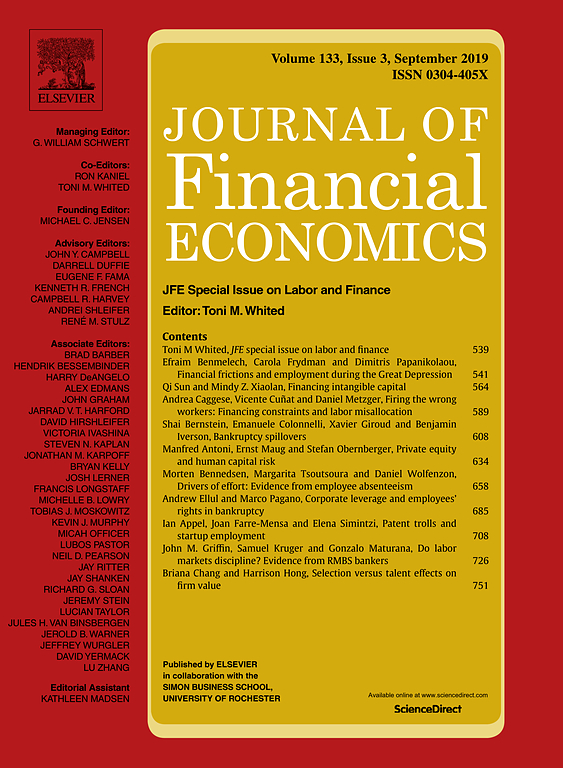
Democracy and Credit
in: Journal of Financial Economics, No. 2, 2020
Abstract
Does democratization reduce the cost of credit? Using global syndicated loan data from 1984 to 2014, we find that democratization has a sizable negative effect on loan spreads: a 1-point increase in the zero-to-ten Polity IV index of democracy shaves at least 19 basis points off spreads, but likely more. Reversals to autocracy hike spreads more strongly. Our findings are robust to the comprehensive inclusion of relevant controls, to the instrumentation with regional waves of democratization, and to a battery of other sensitivity tests. We thus highlight the lower cost of loans as one relevant mechanism through which democratization can affect economic development.

Bank Accounting Regulations, Enforcement Mechanisms, and Financial Statement Informativeness: Cross-country Evidence
in: Accounting and Business Research, No. 3, 2020
Abstract
We construct measures of accounting regulations and enforcement mechanisms that are specific to a country's banking industry. Using a sample of major banks in 37 economies, we find that the informativeness of banks’ financial statements, measured by the value relevance of earnings and common equity, is higher in countries with stricter bank accounting regulations and countries with stronger enforcement. These findings suggest that superior bank accounting and enforcement mechanisms enhance the informativeness of banks’ financial statements. In addition, we find that the effects of bank accounting regulations are more pronounced in countries with stronger enforcement in the banking industry, suggesting that enforcement is complementary to bank accounting regulations in achieving higher value relevance of financial statements. Our study has important policy implications for bank regulators.
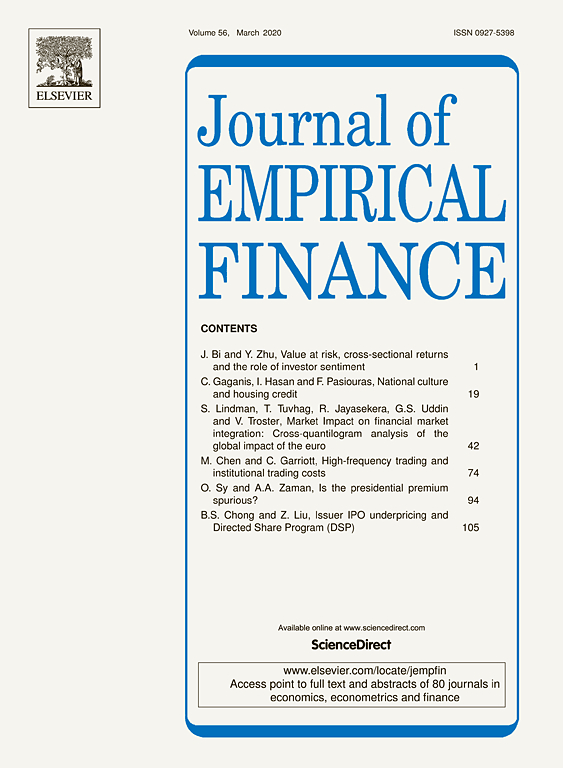
National Culture and Housing Credit
in: Journal of Empirical Finance, March 2020
Abstract
Using a sample of around 30 countries over the period 2001–2015, this study provides evidence that deeply rooted cultural differences are significantly associated with the use of mortgage debt. More detailed, we find that power distance and uncertainty avoidance have a negative impact on the value of the total outstanding residential loans to GDP. This finding is robust across various specifications and the use of alternative measures of mortgage debt. In contrast, trust has a positive and robust impact on all the measures of mortgage debt. Other dimensions of national culture like long-term orientation, individualism, and indulgence, also appear to matter; however, their impact depends on the control variables and the employed measure of mortgage debt.
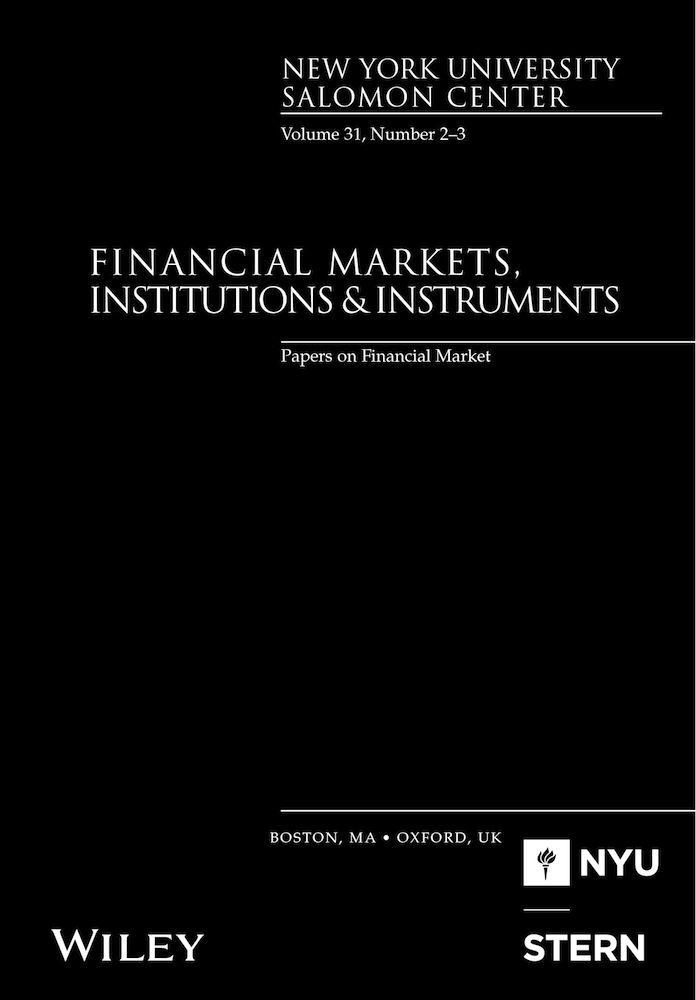
Motivating High‐impact Innovation: Evidence from Managerial Compensation Contracts
in: Financial Markets, Institutions and Instruments, No. 3, 2019
Abstract
We investigate the relationship between Chief Executive Officer (CEO) compensation and firm innovation and find that long‐term incentives in the form of options, especially unvested options, and protection from managerial termination in the form of golden parachutes are positively related to corporate innovation, and particularly to high‐impact, exploratory (new knowledge creation) invention. Conversely, non‐equity pay has a detrimental effect on the input, output and impact of innovation. Tests using the passage of an option expensing regulation (FAS 123R) as an exogenous shock to option compensation suggest a causal interpretation for the link between long‐term pay incentives, patents and citations. Furthermore, we find that the decline in option pay following the implementation of FAS 123R has led to a significant reduction in exploratory innovation and therefore had a detrimental effect on innovation output. Overall, our findings support the idea that compensation contracts that protect from early project failure and incentivize long‐term commitment are more suitable for inducing high‐impact corporate innovation.

Lock‐in Effects in Relationship Lending: Evidence from DIP Loans
in: Journal of Money, Credit and Banking, No. 4, 2019
Abstract
Do prior lending relationships result in pass‐through savings (lower interest rates) for borrowers, or do they lock in higher costs for borrowers? Theoretical models suggest that when borrowers experience greater information asymmetry, higher switching costs, and limited access to capital markets, they become locked into higher costs from their existing lenders. Firms in Chapter 11 seeking debtor‐in‐possession (DIP) financing often fit this profile. We investigate the presence of lock‐in effects using a sample of 348 DIP loans. We account for endogeneity using the instrument variable (IV) approach and the Heckman selection model and find consistent evidence that prior lending relationship is associated with higher interest costs and the effect is more severe for stronger existing relationships. Our study provides direct evidence that prior lending relationships do create a lock‐in effect under certain circumstances, such as DIP financing.
Working Papers

Ecological Preferences and the carbon Intensity of Corporate Investment
in: IWH Discussion Papers, No. 2, 2025
Abstract
<p>Lowering carbon intensity in manufacturing is necessary to transform current production technologies. We test if local agents’ preferences, revealed by vote shares for the Green party during local elections in Germany, relate to the carbon intensity of investments in production technologies. Our sample comprises all investment choices made by manufacturing establishments from 2005-2017. Our results suggest that ecological preferences correlate with significantly fewer carbon-intensive investment projects while investments stimulating growth and reducing carbon emissions increase by 14 percentage points. Both results are more distinct in federal states where the Green Party enjoys political power and local ecological preferences are high.</p>
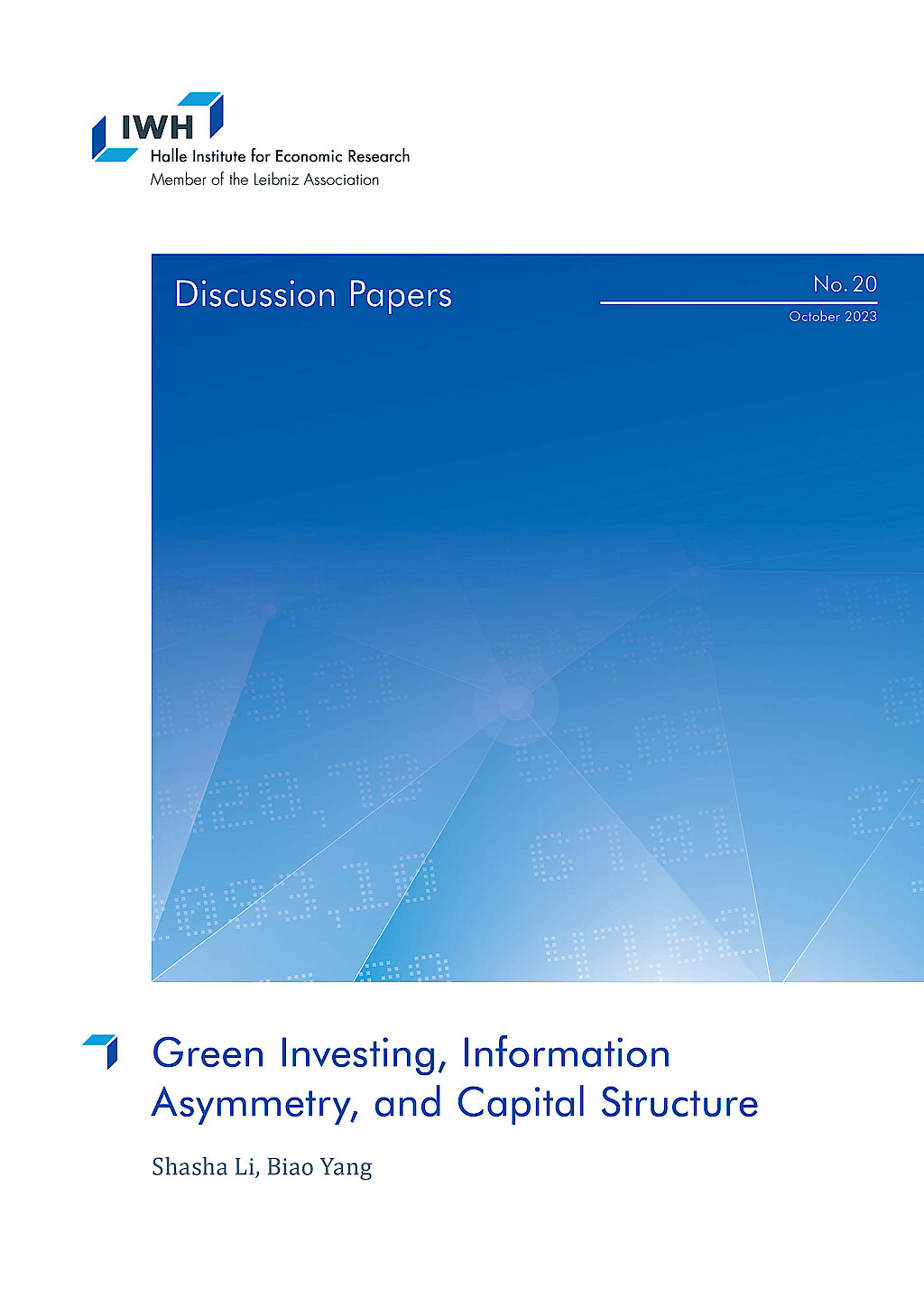
Green Investing, Information Asymmetry, and Capital Structure
in: IWH Discussion Papers, No. 20, 2023
Abstract
We investigate how optimal attention allocation of green-motivated investors changes information asymmetry in financial markets and thus affects firms‘ financing costs. To guide our empirical analysis, we propose a model where investors with heterogeneous green preferences endogenously allocate limited attention to learn market-level or firm-specific fundamental shocks. We find that a higher fraction of green investors in the market leads to higher aggregate attention to green firms. This reduces the information asymmetry of green firms, leading to higher price informativeness and lower leverage. Moreover, the information asymmetry of brown firms and the market increases with the share of green investors. Therefore, greater green attention is associated with less market efficiency. We provide empirical evidence to support our model predictions using U.S. data. Our paper shows how the growing demand for sustainable investing shifts investors‘ attention and benefits eco-friendly firms.
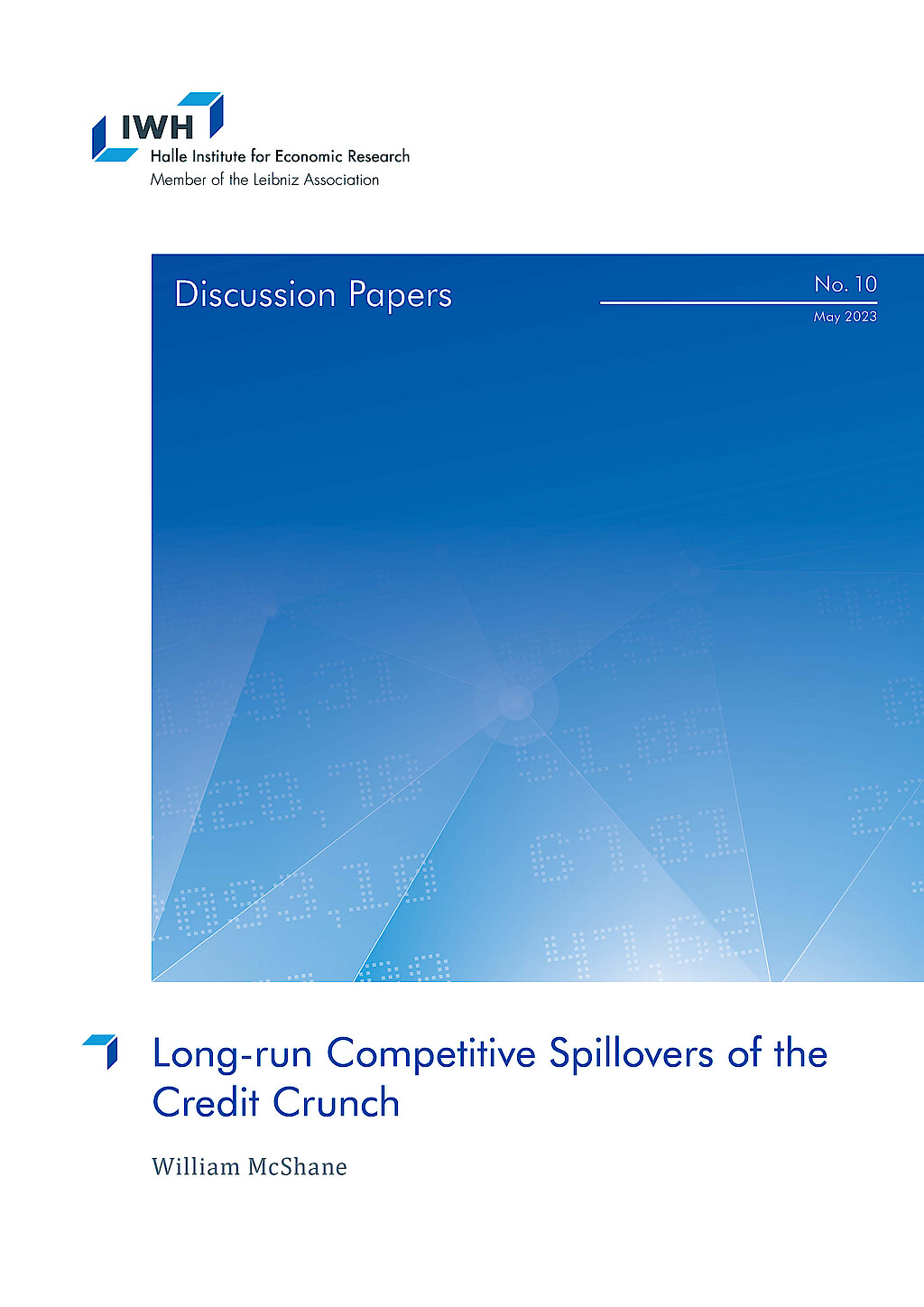
Long-run Competitive Spillovers of the Credit Crunch
in: IWH Discussion Papers, No. 10, 2023
Abstract
Competition in the U.S. appears to have declined. One contributing factor may have been heterogeneity in the availability of credit during the financial crisis. I examine the impact of product market peer credit constraints on long-run competitive outcomes and behavior among non-financial firms. I use measures of lender exposure to the financial crisis to create a plausibly exogenous instrument for product market credit availability. I find that credit constraints of product market peers positively predict growth in sales, market share, profitability, and markups. This is consistent with the notion that firms gained at the expense of their credit constrained peers. The relationship is robust to accounting for other sources of inter-firm spillovers, namely credit access of technology network and supply chain peers. Further, I find evidence of strategic investment, i.e. the idea that firms increase investment in response to peer credit constraints to commit to deter entry mobility. This behavior may explain why temporary heterogeneity in the availability of credit appears to have resulted in a persistent redistribution of output across firms.
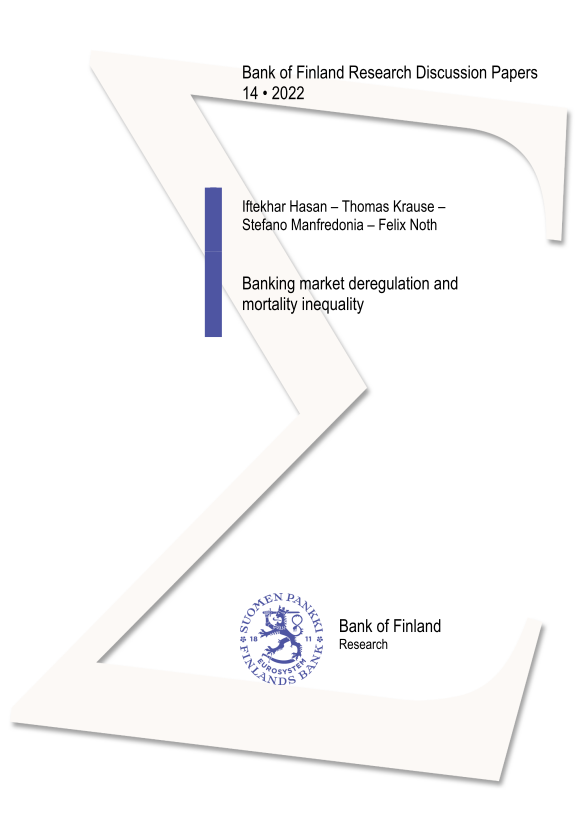
Banking Market Deregulation and Mortality Inequality
in: Bank of Finland Research Discussion Papers, No. 14, 2022
Abstract
This paper shows that local banking market conditions affect mortality rates in the United States. Exploiting the staggered relaxation of branching restrictions in the 1990s across states, we find that banking deregulation decreases local mortality rates. This effect is driven by a decrease in the mortality rate of black residents, implying a decrease in the black-white mortality gap. We further analyze the role of mortgage markets as a transmitter between banking deregulation and mortality and show that households' easier access to finance explains mortality dynamics. We do not find any evidence that our results can be explained by improved labor outcomes.
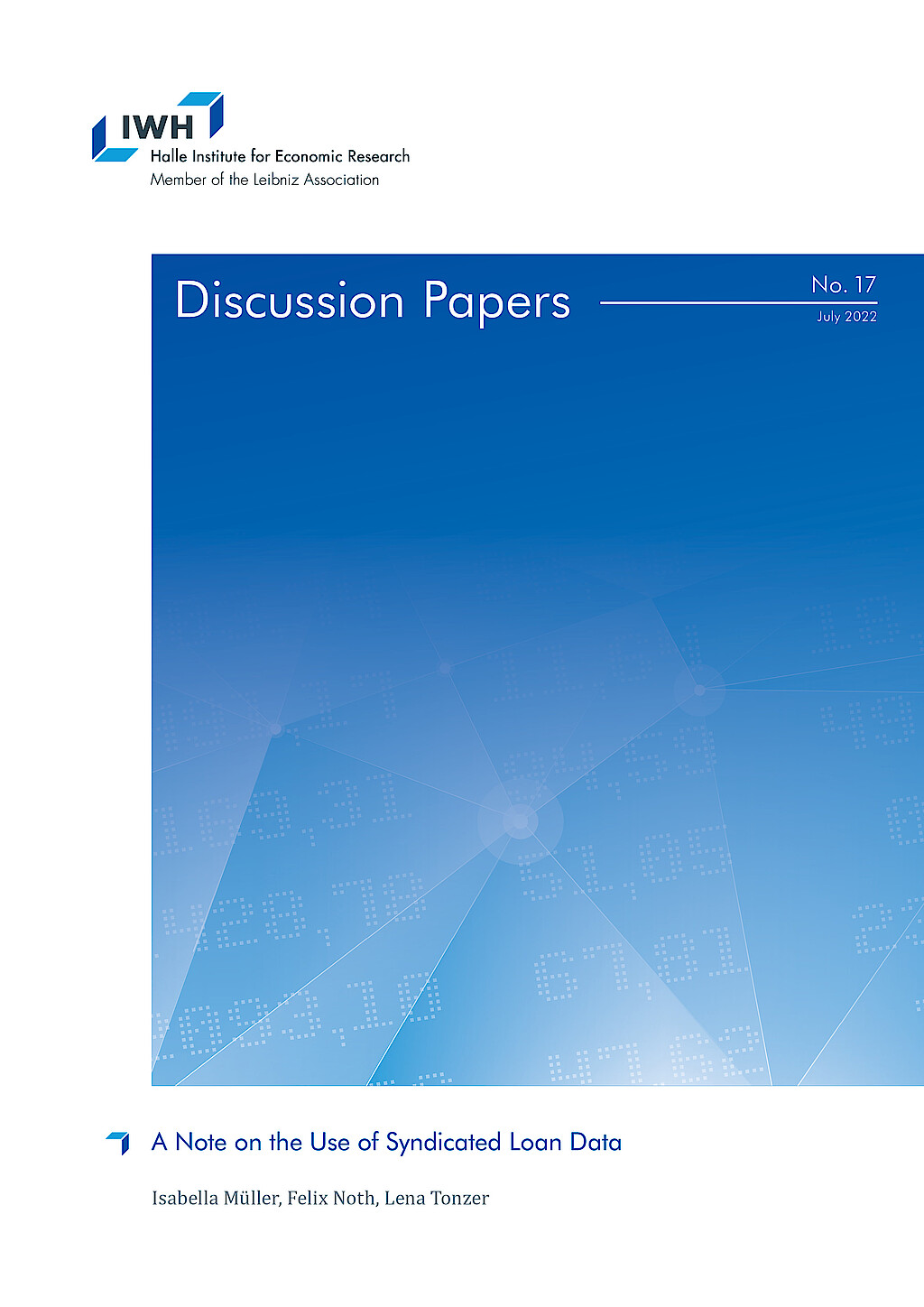
A Note on the Use of Syndicated Loan Data
in: IWH Discussion Papers, No. 17, 2022
Abstract
<p>Syndicated loan data provided by DealScan is an essential input in banking research. This data is rich enough to answer urging questions on bank lending, e.g., in the presence of financial shocks or climate change. However, many data options raise the question of how to choose the estimation sample. We employ a standard regression framework analyzing bank lending during the financial crisis of 2007/08 to study how conventional but varying usages of DealScan affect the estimates. The key finding is that the direction of coefficients remains relatively robust. However, statistical significance depends on the data and sampling choice and we provide guidelines for applied research.</p>



















